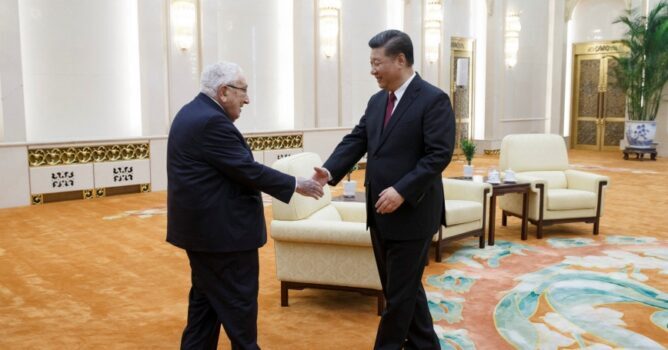
Written by Marah Al Bukai
He is amongst the most notable American figures who helped shape a new era of foreign policy as the head of US diplomacy. However, his political brilliance leads him to be the national security adviser under President Richard Nixon.
He reached a ceasefire in North Vietnam in 1973, a notably significant political success during his time as the US secretary of state. Later on, it paved the way for the United States to exit this war in 1975. He merited the Nobel Peace Prize for his actions and received the prize in 1973.
Nicknamed “the fox of American politics, ” at ninety-seven, he is still robust and witty, wandering between continents and giving brilliant lectures and speeches on governmental and public occasions. His political visions still simultaneously draw broad lines for significant international policies and American diplomacy.
Henry Kissinger is one of the few who knows the secret formula of American politics. He also has a deep understanding of the corridors regarding the deep state, which paves the way for policies in America and the world.
Kissinger still pays excellent attention to American relations with the rival and the greatest adversary of America: China. He analyzes this strained relationship with a political discernment, unlike any other.
Contrary to the senior decision-makers in the White House, Kissinger stresses the importance of establishing a dialogue between Beijing and Washington. He believes That there is always a need to build solid communications that can produce meaningful and balanced bilateral relations between the two countries and find ways to reduce this fragile relationship, supporting creative ideas and historical-philosophical thought. In his opinion, talks can strengthen the relations between the two countries in light of the new world order, which was interrupted by Russia’s war on Ukraine.
Kissinger believes that the creation of new world order is currently in the process of being established. The new system has become an urgent necessity due to the growing number of independent and sovereign states around the globe, and for the spread of democratic ideology, the principles of political participation, and the peaceful transfer of power. Building a new system based on these principles has become the ambition of most independent sovereign states.
Kissinger stresses that building the new world order must take place with the participation of the countries of the whole world by paying attention to the notable changes that take place in this world, raising awareness of supposed partnerships that witness conflicts between countries, and building this system despite the sophistication of its security and unstable political conditions.
He strongly believes in the power of communication through social and technological platforms with all their advantages and disadvantages, while keeping a close eye on the emergence of ideological extremism movements that, in their abnormal cases, use religion as a cover for their violent acts that have afflicted the entire world with terror, shock, and fear of the world’s future in light of the wave of obscurantist terrorism.
Kissinger watches carefully the significant events that some states around the globe are going through, which raise anxiety and fear for the future of all humanity. Kissinger sees the current world order as going through a real crisis echoed in a scene of mobile wars, turmoil, and civil and political violence ignited in several countries.
In Syria and Iraq, armed terrorist groups finance themselves through terrorism and exert control with knives and bullets, aiming to establish a caliphate state on earth. And ISIS is only the most extreme and violent form of its multiple cross-border versions, such as Al-Qaeda, Bako Haram, and others. With their violent ideology based on beheading, bloodshed, and intimidation of people.
On a different issue, intense tension dominates the relations between two countries, Russia and The United States, not to mention the severe strikes caused by their contradictory positions on the wars in Syria and Ukraine. As for the balance of relations between the United States and China, Kissinger believes that it is more sensible and often swings between trying to cooperate, normalizing the relationship, and clashing, tension, and exchanging accusations at times.
Kissinger is inherent in Western societies’ political, economic, and social concepts. He found in the United States a global leadership that assumed the hegemony of world politics immediately following World War II, building the foundations of its leadership on the principles of freedom and democracy that are the basis of its political system on its soil.
Kissinger praises the policy of former US President Barack Obama, which focused on creating a collaborative global body established on the concepts of security and achieving political and economic stability in a contemporary manner, which he pursued.
Henry Kissinger does not see a new world order based on unipolarity, but instead, a system of partnership between the United States and China, while excluding Russia from the new world leadership [. He sees the new world order from this objective perspective of the twenty-first-century world.
Translated by: Abdelrahman Elnaggar
